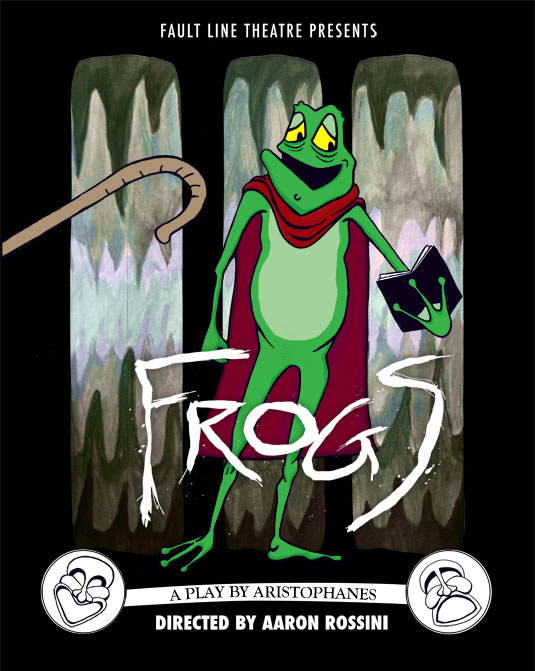Fault Line Theatre’s new production of Frogs - the Ancient Greek play written by Aristophanes – is reminiscent of Cupcake Wars. Wait… stay with me here – I promise this will make sense in a second. So, Cupcake Wars is all about taking the basic ingredients and saying “There … there you go. You all have the same items. Now go create something magical and wonderful that I would never have expected from this. And make it radically different from the guy standing next to you”. That’s the challenge of taking a play written in 405 BC and making it both exciting, relevant and modern while still keeping the time-honored tenets in tact. Director Aaron Rossini and company not only succeed in creating something magical and wonderful, they excel.
The plot itself isn’t very complicated; it begins with Dionysus (Haas Regen) and his devoted – if overtaxed – servant Xanthias (Blake Segal) hatching a scheme which involves Dionysus pretending to be his half-brother Heracles (Matt Clevy) in order to gain safe passage to Hades to bring Euripides (Craig Wesley Divino) back from the land of the dead. So, think Crosby and Hope in “Road to Hades” where the goal isn’t so much to get the girl in the end as it is to get the dazzling poet who (one hopes) will come back topside and make everything right because if there’s one thing everyone knows … the only way to stop civil unrest is with a poet.
There’s a lot of hijinx but really … let’s get to the part you’re waiting for. I know it’s the part I was waiting for: the frogs. Are there frogs? Of course. Frogs abound as Charon ferries Dionysus across the river and out they pop in their green glory with a chorus of Brekekekex, ko-ax, ko-ax and all manner of instruments (ukulele, guitar, accordion) and soon there’s a rollicking good time as the troop in their emerald swimmies frolic around like a 1920s musical review while still holding true to the original theme.
And this is just the beginning of the romping. Once Dionysus sets about making his way through Hades in search of Euripides the musical numbers keep coming — and with all of the company doing double- and triple-duty as actors, singers, dancers and sometimes even musicians there’s no doubt that this talented bunch is both show-stopping as well as downright foot-stomping. Each musical number is performed with incredible energy and conviviality; this is a likeable bunch and they win you over at every turn. All the original music, by Eric Thomas Johnson, is catchy, upbeat and rousing. It moves the story along and gives it a playful and bouncy edge which is in perfect balance to the longer scenes which play out later.
Back to the story …
Once in Hades after more hi-jinx and switch-a-roos (and, I’ll admit, a few too many scatological jokes for my particular taste) we find that Dionysus has stumbled into a pre-existing mess … while unrest abounds up top seems like there’s a little rivalry going on down below as well. Oh, this bickering. Can’t it ever be escaped?
AEACUS: Fighting and arguing. Screaming and debating. There’s serious trouble among the dead at the moment … the best artist, best singer, best playwright, whoever is the best in each of the Fine Arts disciplines has the right to have his dinner or whatever in the Great Hall right up next to Pluto’s throne.
Euripides has only just died, but as the new kid on the block with a chip on his shoulder he sees no reason not to try and oust the (in his estimation) stuffy and overblown Aeschylus (Karl Gregory) from his place. Since Dionysus is down there to gain a poet, it’s only right that he watch the competition. Sure, he came for Euripides but since there’s a competition going on anyway, maybe he’ll leave with Aeschylus instead. So, in essence, he becomes the guest judge on American Idol. (Or, you know … Cupcake Wars.)
Watching Aeschylus and Euripides verbally spar for the title was absolutely where Frogs turned the corner from delightful musical romp to brilliant theatre. Just one would be fine but to have both in one evening is absolutely a gift to theatregoers. Gregory’s Aeschylus is all pomp, circumstance and arched eyebrow … he’s got a smugness that you both want to revel in as much as you want to slap it off his face. He’s like that showoff in class who always has his hand raised and while you’d rather have anyone but him answer the question you know he will give the most eloquent answer. Of course, this is exactly Euripides’s issue: From beginning to end, it’s gibberish … Scamanders, sepulchers, bronze-clad vulture-eagles, words like the wall of a fortress, impossible to batter your way into.
Divino’s Euripides is much smoother. Still full of himself, sure, but in a 60s jazz hipster poet hep-cat way. He’s rebellious, questions authority, and it is this exact behavior that Aeschylus feels makes Euripides unfit.
AESCHYLUS: Decent women, married to decent men driven to suicide in your plays.
EURIPIDES: Did I invent the story of Medea? Phaedra?
AESCHYLUS: No, but you put them onstage. Didn’t hide them. Children have teachers to teach them, adults have playwrights. We must set good examples.
All turtleneck and leather jacket, Euripides acts like he couldn’t care less but of course he couldn’t care more about this competition. He needs to win. He needs to have his words be deemed weightier (which is how they are being measured, and which is how, ultimately, the competition is to be won).
Dionysus is at odds: “I don’t know what to do. I like them both so much. I want to be friends with both of them. How am I to judge? How can I? One is so clever, the other so satisfying. One a master, the other I just love.” Well, you know, we’ve all been torn between two lovers, feeling like a fool … you’ve got to choose. And he does of course. I won’t give the ending away … (It’s a 2500 year old play, but still, I’ll play along) but suffice it to say, Dionysus leaves with his poet and the chorus asks “Let his majestic brain help us end war and pain.”
From start to finish the entire ensemble is winning; while the main characters certainly steal the show at times there is no doubt that without the buoyancy of the hugely talented group creating a full, rich night this would be quite a different piece.
Fault Line Theatre is both a relatively new as well as a relatively young company but beyond a doubt they have a clear vision, a strong voice and a talented ensemble. After seeing Frogs I look forward to more productions.
~~~
Frogs Written by Aristophanes Directed by Aaron Rossini Fourth Street Theatre 83 4th St. (b/t 2nd Ave. and Bowery) November 4—19, 2011 Click here to Buy Tickets or call 212.868.4444









{ 0 comments… add one now }
{ 1 trackback }